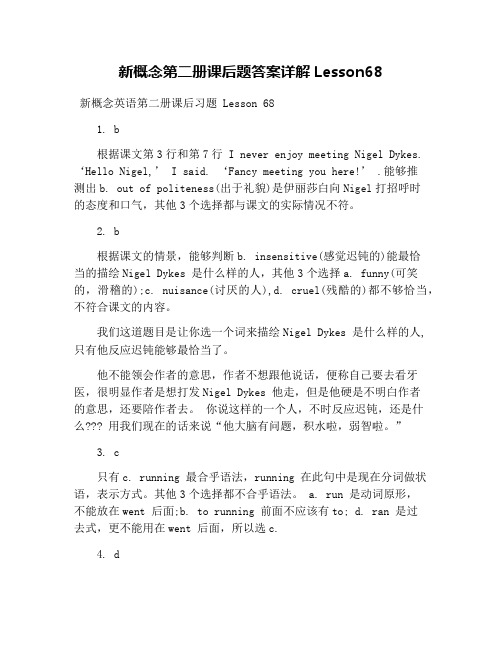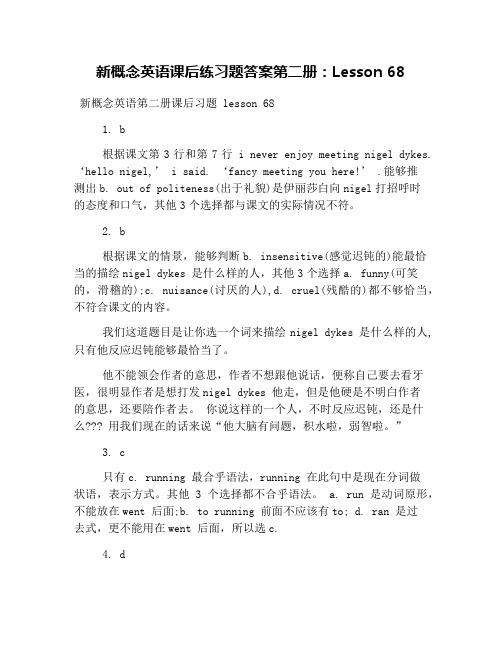新概念英语第二册课后题答案详解Lesson68
新概念第二册课后题答案详解Lesson68

新概念第二册课后题答案详解Lesson68新概念英语第二册课后习题 Lesson 681. b根据课文第3行和第7行 I never enjoy meeting Nigel Dykes. ‘Hello Nigel,’ I said. ‘Fancy meeting you here!’ .能够推测出b. out of politeness(出于礼貌)是伊丽莎白向Nigel打招呼时的态度和口气,其他3个选择都与课文的实际情况不符。
2. b根据课文的情景,能够判断b. insensitive(感觉迟钝的)能最恰当的描绘Nigel Dykes 是什么样的人,其他3个选择a. funny(可笑的,滑稽的);c. nuisance(讨厌的人),d. cruel(残酷的)都不够恰当,不符合课文的内容。
我们这道题目是让你选一个词来描绘Nigel Dykes 是什么样的人,只有他反应迟钝能够最恰当了。
他不能领会作者的意思,作者不想跟他说话,便称自己要去看牙医,很明显作者是想打发Nigel Dykes 他走,但是他硬是不明白作者的意思,还要陪作者去。
你说这样的一个人,不时反应迟钝,还是什么??? 用我们现在的话来说“他大脑有问题,积水啦,弱智啦。
”3. c只有c. running 最合乎语法,running 在此句中是现在分词做状语,表示方式。
其他3个选择都不合乎语法。
a. run 是动词原形,不能放在went 后面;b. to running 前面不应该有to; d. ran 是过去式,更不能用在went 后面,所以选c.4. d该句中的worth (值得……的)是形容词,它后面只能跟名词或动名词。
a. to do, b. do , c. done 都不是动名词,所以都不符合语法;只有d. doing 是动名词,所以选d.5. b该句需要选一个同前一句中的never has anything to do (从来无事可做)意义相同的短语。
逐句精讲新概念英语第二册第68课 纠缠不休

逐句精讲新概念英语第二册:第68课纠缠不休Lesson 68: Persistent新概念英语2课文内容:I crossed the street to avoid meeting him, but he saw me and came running towards me. It was no usepretending that I had not seen him, so I waved to him. I never enjoy meeting Nigel Dykes. He never has anything to do. No matter how busy you are, he always insists on coming with you. I had to think of a way of preventing him from following me around all morning."Hello, Nigel," I said. "Fancy meeting you here!""Hi, Elizabeth," Nigel answered. "I was just wondering how to spend the morning -- until I saw you. You're not busy doing anything, are you?""No, not at all," I answered. "I'm going to...""Would you mind my coming with you?" he asked, before I had finished speaking."Not at all," I lied, "but I"m going to the dentist.""Then I'll come with you," he answered. "There's always plenty to read in the waiting room!新概念英语2逐句精讲:1、I crossed the street to avoid meeting him, but he saw me and came running towards me.我穿过马路以便避开他,但他看到我并朝我跑了过来。
新概念英语第二册:第68课课文详解及语法解析

【导语】新概念英语作为家喻户晓的经典之作,它有着全新的教学理念,有趣的课⽂内容及其全⾯的技能训练,为⼴⼤的英语学习者提供帮助!如果你也想学好英语,⼜怎能错过新概念英语?下⾯为您提供了相关内容,希望对您有所帮助! 课⽂详注 Further notes on the text 1.I crossed the street to avoid meeting him, but he saw me and came running towards me. 我穿过马路以便避开他,但他看到我并朝我跑过来。
(1)avoid 以及本课中出现的 enjoy, fancy, mind, finish等动词后⾯只跟名词性的宾语,即只跟名词或动名词: They managed to avoid a car crash/crashing their car into the wall. 他们设法躲过了⼀起汽车撞车事故/避免了将车撞在墙上。
(2)running 引导的是分词短语,作状语,修饰 came,表⽰伴随状况: She ran after the thief shouting out for help. 她⼀边追赶⼩偷,⼀边⼤声喊叫求助。
2.It was no use pretending that I had not seen him…若再装做没看见他已是没有⽤了…… 这句话中,it是先⾏主语,真正的主语是 pretending 引导的动名词短语。
It is (of) no use doing…是个固定结构(其中的 of 可省略),表⽰“做……也是徒劳的/⽆益的”: It is (of) no use worrying about your family. 为你的家⼈担⼼是⽆益的。
3.No matter how busy you are…不管你多忙…… no matter可与疑问词 (how, who, when, where, what等)⼀起引导让步从句,表⽰“⽆论”: No matter where you go, you can't forget your home. ⽆论你到哪⾥,都⽆法忘记⾃⼰的家。
新概念英语二第68课作文答案

新概念英语二第68课作文答案英文回答:In the 68th lesson of New Concept English 2, the author presents a thought-provoking topic that explores the potential benefits and drawbacks of knowing the future. The narrative begins with a hypothetical scenario in which an individual is granted the ability to foresee future events. This premise sets the stage for a profound examination of the ethical, psychological, and societal implications of such knowledge.The author argues that the potential benefits of knowing the future are vast and multifaceted. With the power of foresight, one could make informed decisions, plan effectively, and avoid potential pitfalls. The ability to anticipate events could lead to greater personal success, financial stability, and overall well-being. Moreover, the knowledge of future events could empower individuals to make meaningful contributions to society, such aspreventing disasters or promoting social change.However, the author also acknowledges the potential drawbacks of knowing the future. One significant concern is the psychological toll it could take on an individual. The constant burden of foreseeing both positive and negative events could lead to anxiety, stress, and a diminished sense of spontaneity. Additionally, the author raises the ethical question of whether it is fair or responsible to possess knowledge that others do not.Another potential drawback of knowing the future is the risk of complacency and inaction. If one knows that a certain outcome is inevitable, they may become less motivated to take action and shape their destiny. This could lead to a passive and unfulfilling existence. Furthermore, the author argues that the knowledge of future events could undermine the element of surprise and serendipity that often brings joy and meaning to life.Ultimately, the author concludes that the decision of whether or not to know the future is a complex and deeplypersonal one. There are both potential benefits and drawbacks to consider, and each individual must weigh the potential consequences carefully before making a choice.中文回答:在新概念英语二的第68课中,作者提出了一个发人深思的话题,探讨了了解未来的潜在好处和弊端。
新版 新概念英语二册讲义--68

knowledge.
• pretend
v.假装;伪装;装作
• pretend ignorance
装无知
• pretend to do sth
avoid v. 避开
• She braked suddenly and avoided an accident. • 她紧急刹车,避免了一场车祸。
• avoid doing sth. 避免做… • People in that small town avoid talking to
outsiders. • 那个小镇上的人们不愿意与外来的人说话。 • He was always careful to avoid embarrassing
假装做某事
• Sometimes the boy pretended to be asleep.
• 有时这个男孩会假装睡着了。
• Don't pretend to know when you don't.
• 不要不懂装懂。
• pretend + 从句 • Many people pretend that they understand
• 2. vt. &vi. 坚决主张/要求,一定要 • (从句用虚拟语气,should+动原)
• I insist on speaking to the manager. • My wife insists that I (should) have my hair cut.
课文解析
新概念英语课后练习题答案第二册:Lesson 68

新概念英语课后练习题答案第二册:Lesson 68新概念英语第二册课后习题 lesson 681. b根据课文第3行和第7行 i never enjoy meeting nigel dykes. ‘hello nigel,’ i said. ‘fancy meeting you here!’ .能够推测出b. out of politeness(出于礼貌)是伊丽莎白向nigel打招呼时的态度和口气,其他3个选择都与课文的实际情况不符。
2. b根据课文的情景,能够判断b. insensitive(感觉迟钝的)能最恰当的描绘nigel dykes 是什么样的人,其他3个选择a. funny(可笑的,滑稽的);c. nuisance(讨厌的人),d. cruel(残酷的)都不够恰当,不符合课文的内容。
我们这道题目是让你选一个词来描绘nigel dykes 是什么样的人,只有他反应迟钝能够最恰当了。
他不能领会作者的意思,作者不想跟他说话,便称自己要去看牙医,很明显作者是想打发nigel dykes 他走,但是他硬是不明白作者的意思,还要陪作者去。
你说这样的一个人,不时反应迟钝,还是什么??? 用我们现在的话来说“他大脑有问题,积水啦,弱智啦。
”3. c只有c. running 最合乎语法,running 在此句中是现在分词做状语,表示方式。
其他3个选择都不合乎语法。
a. run 是动词原形,不能放在went 后面;b. to running 前面不应该有to; d. ran 是过去式,更不能用在went 后面,所以选c.4. d该句中的worth (值得……的)是形容词,它后面只能跟名词或动名词。
a. to do, b. do , c. done 都不是动名词,所以都不符合语法;只有d. doing 是动名词,所以选d.5. b该句需要选一个同前一句中的never has anything to do (从来无事可做)意义相同的短语。
Lesson68persistent课文详解与练习-新概念英语第二册

新概念英语第二册Lesson 68Persistent 纠缠不休I crossed the street to avoid meeting him, but he saw me and came running towards me. It was no use pretending that I had not seen him, so I waved to him. I never enjoy meeting Nigel Dykes. He never has anything to do. No matter how busy you are, he always insists on coming with you. I had to think of a way of preventing him from following me around all morning.Hello, Nigel, I said. Fancy meeting you here!Hi, Elizabeth, Nigel answered. I was just wondering how to spend the morning -- until I saw you. Youre not busy doing anything, are you?No, not at all, I answered. Im going to...Would you mind my coming with you? he asked, before I had finished speaking.Not at all, I lied, but Im going to the dentist.Then Ill come with you, he answered. Theres always plenty to read in the waiting【课文翻译】I crossed the street to avoid meeting him, but he saw me and came running towards me.我穿过马路以便避开他,但他看到我并朝我跑过来。
新概念英语第二册 L68 persistent

2. 避免
avoid +n./+doing No one can avoid making mistakes while
learning a foreign language.
Avoidable
pretend [pri'tend] v.
1.Could you tell me some words that can express feelings?
like, hate, love, boring, angry, happy, sad, frightened, afraid, upset, nervous……
2.What would you do when you come across 偶遇 someone you don't like?
We might not change others and the environment around that we don't like, but what we can change is our attitude towards them.
1.Ic_r_o_ss_e_d the street to avoid meeting him, but he saw me and came running __to_w_a_r_dsme.
I crossed the street to avoid meeting him, but he saw me and came running towards me. cross v. 穿过 I cross the garden. across adv.&prep. 穿过 I go across the garden.
- 1、下载文档前请自行甄别文档内容的完整性,平台不提供额外的编辑、内容补充、找答案等附加服务。
- 2、"仅部分预览"的文档,不可在线预览部分如存在完整性等问题,可反馈申请退款(可完整预览的文档不适用该条件!)。
- 3、如文档侵犯您的权益,请联系客服反馈,我们会尽快为您处理(人工客服工作时间:9:00-18:30)。
新概念英语第二册课后题答案详解Lesson68
1. b
根据课文第3行和第7行 I never enjoy meeting Nigel Dykes. ‘Hello Nigel,’ I said. ‘Fancy meeting you here!’ .能够推
测出b. out of politeness(出于礼貌)是伊丽莎白向Nigel打招呼时
的态度和口气,其他3个选择都与课文的实际情况不符。
2. b
根据课文的情景,能够判断b. insensitive(感觉迟钝的)能最恰当的描绘Nigel Dykes 是什么样的人,其他3个选择a. funny(可笑的,滑稽的);c. nuisance(讨厌的人),d. cruel(残酷的)都不够恰当,不符合课文的内容。
我们这道题目是让你选一个词来描绘Nigel Dykes 是什么样的人,只有他反应迟钝能够最恰当了。
他不能领会作者的意思,作者不想跟他说话,便称自己要去看牙医,很明显作者是想打发Nigel Dykes 他走,但是他硬是不明白作者
的意思,还要陪作者去。
你说这样的一个人,不时反应迟钝,还是什么??? 用我们现在的话来说“他大脑有问题,积水啦,弱智啦。
”
3. c
只有c. running 最合乎语法,running 在此句中是现在分词做
状语,表示方式。
其他3个选择都不合乎语法。
a. run 是动词原形,不能放在went 后面;b. to running 前面不应该有to; d. ran 是过
去式,更不能用在went 后面,所以选c.
4. d
该句中的worth (值得……的)是形容词,它后面只能跟名词或动名词。
a. to do, b. do , c. done 都不是动名词,所以都不符合语法;只有d. doing 是动名词,所以选d.
5. b
该句需要选一个同前一句中的never has anything to do (从来无事可做)意义相同的短语。
a. has to do nothing (什么都不必做)同前一句意思不符;c. nothing has to do 和d. to do nothing has 都是语序混乱,没有意义;只有b. has nothing to do (无事可做)同never has anything to do 意义相同,所以选b.
6. b
该句的动词insisted(坚持)后面需要跟on+动名词或that引导的从句,其谓语一定要用should加动词原形。
a. to go, c. to going, d. in going 都不符合语法,只有
b. that he should go 能够跟在insist后面做宾语,所以选b.
7. b
该句中的动词mind(介意)后面能够直接跟动名词也能够在动名词前加宾格或所有格代词,但所表达的意思不同.
a.-若什么也不加,虽然合乎语法,但句子意思有些含糊不清,因为主语she同最后的her不知是否是一个人,如果是一个人,句子前后矛盾,如果是两个人,没有上下文能够证明,故不能选a.
c. he 是主格代词
d. himself是反身代词
3者都不符合语法,只有b. his是所有格代词,既符合语法和题目意思,所以选b.
8. c
该句需要选一个后面能跟动名词做宾语的动词或词组。
a.
prevent (阻止)后面不能直接跟动名词,应该是prevent sb. from doing sth.; b. prevent from 不合乎语法,因为prevent 是及物动词后面应该带宾语,即prevent sb. from …; d. escape from (逃避,避免疾病、痛苦、事故等)后面跟名词,但很少接动名词,词意思
也不太符合这个句子;只有 c. avoid (避开)后面只能跟动名词做宾语,所以选c.
9. c
该句需要一个同前一句中的动词pretend(假装)含义相同的短语。
a. make as if(制作得好像……一样);
b. do as if(做得好像……一样);
d. conduct as if(表现或举止好像……一样);这3个选择都与pretend含义不同。
只有c. act as if(假装像……一样)与pretend的含义相同,
act有假装的意思,所以选c.
10. c
前一句中的谓语动词waved to 意思为“向……招手”,本句需
要选同这个词含义相同的词。
a. shook (握手,shake 的过去式) 和b. saluted (向……致敬,敬礼);c. greeted (问候,打招呼)和d.
called (叫喊,召唤)中,只有c. 同waved to 含义最接近,所以选c.
11. a
前一句Fancy meeting you here ! 是感叹句,意思:想不到在
这儿见到你!fancy 是动词,表示“想像”本句需要选一个同这个动词
意义相同并且表示“惊讶”的词做感叹句。
b. think (考虑);c. Consider (考虑); d. Contemplate (沉思)3个选择都与Fancy 的含
义不符,也不能做感叹词,表示惊讶,所以选a.
12. a
该句需要选一个合适的词,以便进一步解释前一句She lied to him (她向他说谎)。
报只有a. false (假的)最能说明前一句的“说谎”。
而其他3个选择中:b. true (真实的)与说谎意义相反;c. lie (谎言)是名词,虽然符合题目意思,但是它前面应该有冠词a; d. wrong (错的)词意思不如false 贴切,所以选a.。
